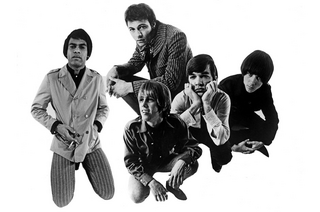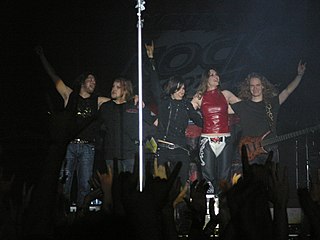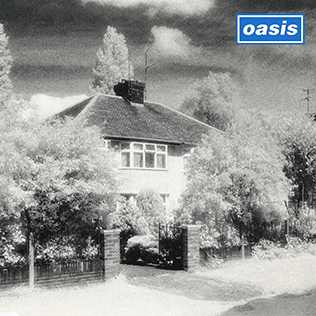
Love is an American rock band formed in Los Angeles in 1965. Led by Arthur Lee, the band's primary songwriter, they were one of the first racially diverse American rock bands. Their sound incorporated an eclectic range of styles including garage, folk-rock, and psychedelia. While finding only modest success on the music charts, peaking in 1966 when their US Top 40 hit "7 and 7 Is" made it to number 33, Love would come to be praised by critics as their third album, Forever Changes (1967), became generally regarded as one of the best albums of the 1960s.
Forever Young may refer to:

End Is Forever is the third studio album by American rock band The Ataris, released on Kung-Fu Records in 2001. The album features a mix of punk and pop punk similar to the band's previous works along with catchy pop rhythms. It contains lyrics that span nostalgia, growing up, love, relationships, and singer Kris Roe's childhood. End is Forever is notable for its many pop culture references and numerous lyrics that Roe describes as having "hidden meanings" encoded within.

Alphaville is a German synth-pop band formed in Münster in 1982. They gained popularity in the 1980s. The group was founded by singers Marian Gold, Bernhard Lloyd, and Frank Mertens. They achieved chart success with the singles "Forever Young", "Big in Japan", "Sounds Like a Melody", "The Jet Set", and "Dance with Me". Gold remains the only continuous original member of Alphaville. They took their name from Jean-Luc Godard's film of the same name.

After Forever was a Dutch symphonic metal band with strong progressive metal influences. The band relied on the use of both soprano vocals and death growls.
Felt were an English jangle pop band, formed in 1979 in Water Orton, Warwickshire, and led by the mononymous Lawrence. They were active for ten years through the 1980s, releasing ten singles and ten albums, although none reached the UK singles chart or albums chart. The band's name was inspired by Tom Verlaine's emphasis of the word "felt" in the Television song "Venus".

"Live Forever" is a song by the English rock band Oasis. Written by Noel Gallagher, the song was released as the third single from their debut album Definitely Maybe (1994) on 8 August 1994, just prior to that album's release. Gallagher wrote the song in 1991, before he joined Oasis.

Bryan Shelton White is an American country music singer and songwriter. Signed to Asylum Records in 1994 at age 20, White released his self-titled debut album that year. Both it and its follow-up, 1996's Between Now and Forever, were certified platinum by the Recording Industry Association of America, and 1997's The Right Place was certified gold. His fourth album, 1999's How Lucky I Am, produced two top 40 singles, with the song "God Gave Me You" eventually becoming a big hit in the Philippines.

Planet Waves is the fourteenth studio album by American singer-songwriter Bob Dylan, released on January 17, 1974, by Asylum Records in the United States and Island Records in the United Kingdom.

Hot in the Shade is the fifteenth studio album by American rock band Kiss, released in 1989. It is the first Kiss studio album since 1981's Music From "The Elder" to feature lead vocals from someone other than Paul Stanley or Gene Simmons, with drummer Eric Carr singing lead on "Little Caesar". It is also the final Kiss album in its entirety to feature Carr before his death in November 1991 during production of the band’s next album Revenge. Unlike its predecessor album, 1987's Crazy Nights, Hot in the Shade does not heavily feature keyboards.

Invisible Circles is the third studio album by Dutch symphonic metal band After Forever. It was released on 25 March 2004, by the small Dutch label Transmission Records. It is After Forever's first full-length album since the dismissal of guitarist and composer Mark Jansen, whose musical tastes had strongly influenced the sound of their first work Prison of Desire (2000) and their successful second offering Decipher (2001). In this work After Forever choose a new musical direction, mostly revolving around elements of progressive metal instead of the gothic and symphonic metal of previous albums. The creative process for Invisible Circles took more than a year and required the use of three recording studios in the Netherlands and Germany. A long tour to support the album brought the band to some of the most important European rock festivals and to Central and South America.

"Who Wants to Live Forever" is a song by the British rock band Queen. A power ballad, it is the sixth track on the album A Kind of Magic, which was released in June 1986, and was written by lead guitarist Brian May for the soundtrack to the film Highlander. Queen was backed up by an orchestra, with orchestrations by film score composer Michael Kamen. The song peaked at No. 24 in the UK charts. In 1991, it was included in the band's second compilation album, Greatest Hits II.

"Forever Young" is a song by German synth-pop band Alphaville from their 1984 debut studio album of the same name. The single was successful in Scandinavia and in the European German-speaking countries in the same year.
Live Forever or Liveforever may refer to:
Together Forever may refer to:

Forever the Sickest Kids is an American pop punk band from Dallas, Texas. The band first signed with Universal Motown Records and released its debut album, Underdog Alma Mater, on April 29, 2008. The band's second album, Forever the Sickest Kids, was released on March 1, 2011. Universal Motown Records was later shut down in 2011 and the band was left unsigned for over a year until signing to Fearless Records in late 2012. The band released its third studio album, J.A.C.K., on June 25, 2013. In an Alternative Press article, the band was placed number one underground band of the "22 Best Underground Bands".

"Tuesday Afternoon" is a 1968 song written by Justin Hayward that was first released by English rock band the Moody Blues on their 1967 album Days of Future Passed and later released as a single.
Forever More or Forevermore may refer to:

"Forever Young" is a song by Bob Dylan, recorded in California in November 1973. The song first appeared, in two different versions, a slow-pace and a fast-pace, on Dylan's fourteenth studio album Planet Waves.
Comeback Kid may refer to:













